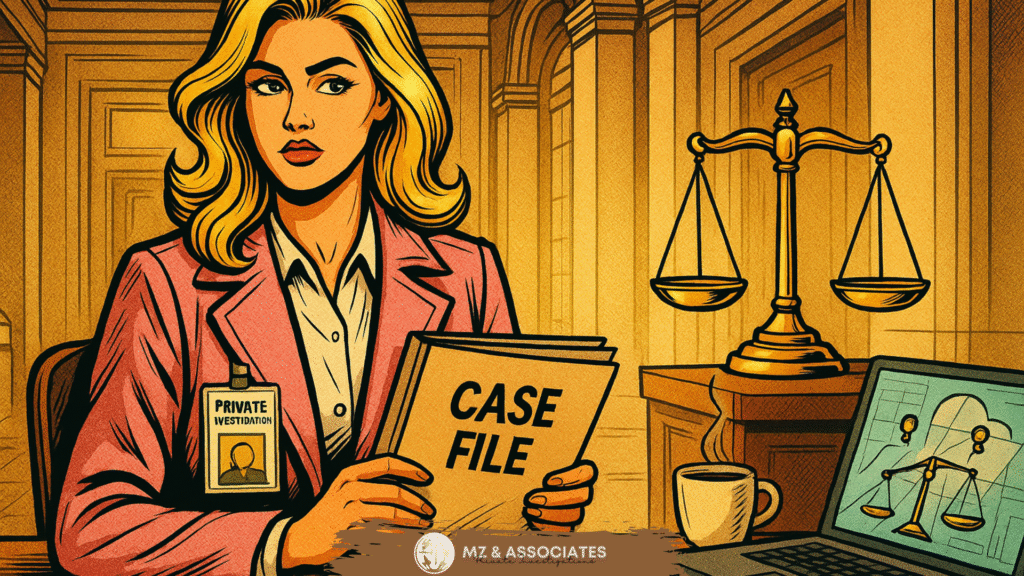
Ethics Under Pressure: How Investigators Maintain Integrity in Court Cases
In legal battles, especially criminal and civil litigation, private investigators are often the unseen heroes—or at times, the unsung villains, depending on how they conduct their work.
When you’re helping to build a defense or uncover the truth in a courtroom, you’re not just delivering facts—you’re shaping outcomes that affect people’s lives.
And that’s where ethics come in.
In a world where the pressure to “win” can tempt even the most experienced professionals, ethical investigators stand out by holding firm to a simple truth: facts must be found, not fabricated.
🧭 1. Understanding the Ethical Landscape of Court Cases
Private investigators involved in litigation must carefully walk a line between aggressive fact-finding and unlawful or unethical behavior.
Key ethical boundaries include:
No unlawful surveillance
No impersonation or deception that violates legal rights
Respect for confidentiality
Accurate, truthful reporting—without bias
Avoiding evidence tampering or withholding critical details
A good PI knows the goal is not just to help a client win—but to support the truth with professionalism and impartiality.
💼 2. Pressure from Clients: The Slippery Slope
In the middle of a tough court case, clients (or attorneys) may ask for shortcuts:
“Can you record this conversation?”
“Can you follow someone inside private property?”
“Can you make this look more ‘favorable’ in the report?”
The ethical PI’s answer? A firm but respectful no.
An ethical investigator is not there to win the case at any cost. They’re there to support the case with credibility and facts. That credibility is everything in court—and once lost, it damages not just the investigator’s reputation, but also the entire case.
📃 3. Maintaining Evidence Integrity
One of the most critical responsibilities a PI has in litigation is handling evidence properly.
That includes:
Chain of custody: Keeping track of how evidence is gathered, transferred, and stored.
Avoiding contamination: Ensuring no one tampers with physical or digital evidence.
Reporting accurately: Never omitting or twisting facts.
Judges and attorneys are increasingly skeptical of “manufactured” investigations. In court, a flawed or questionable report can be thrown out—or worse, used to discredit the entire legal team.
🧠 4. Objectivity Matters More Than Ever
In high-stakes cases, emotions run high. But an investigator must stay grounded, neutral, and focused.
Being unbiased allows investigators to:
Be credible on the stand if called to testify
Provide value to the legal team without misleading them
Reduce liability for all parties involved
Build a long-term, trustworthy reputation
Even if the findings hurt the client’s case, presenting the truth professionally and ethically protects everyone in the long run.
💬 5. Real-World Example: When Doing the Right Thing Paid Off
At MZ & Associates, we once worked with a defense attorney on a personal injury case. The client claimed long-term disability after a workplace accident.
During surveillance, we recorded the individual engaging in intense recreational sports—clear evidence that contradicted their claim.
The attorney was disappointed. But we stood by our report and emphasized that truth and integrity come first. In the end, the honesty paid off—the case settled more fairly, and the attorney became a long-term client because of our reliability.
📚 6. Courtroom Testimony: The Final Test of Integrity
When private investigators are called to testify, everything they’ve done is placed under a microscope.
Questions attorneys (and judges) may ask:
“Were you licensed during the investigation?”
“Did you have consent to gather this information?”
“Were proper procedures followed?”
“Were your methods legal and ethical?”
Investigators who cut corners often fall apart under cross-examination. But those who acted ethically and documented everything clearly will stand up to any scrutiny.
✅ Why Ethics Build Long-Term Success
Private investigators aren’t just fact-finders. They’re truth protectors. By committing to ethics under pressure, they earn:
The trust of legal professionals
The respect of clients
A reputation that opens doors to bigger and more sensitive cases
Legal protection and peace of mind
In today’s courtroom climate, integrity is the ultimate advantage.
👁️🗨️ Conclusion: Choose Truth Over Tricks
Being a private investigator in court cases is about more than being clever or tech-savvy. It’s about being honest, transparent, and courageous enough to tell the truth—especially when it’s hard.
At MZ & Associates, we believe that ethics aren’t optional—they’re essential. And when the stakes are high, we don’t just investigate. We do it right.
